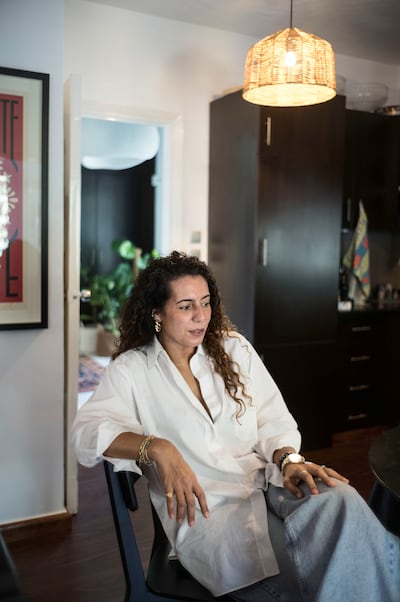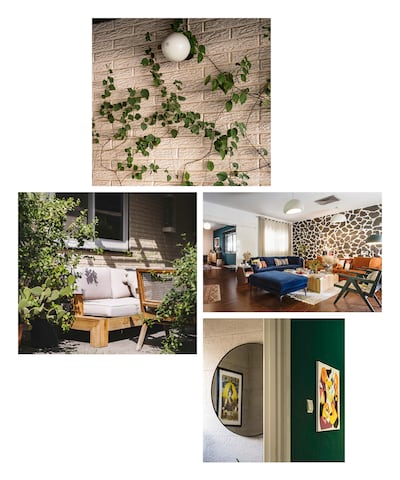In Jumeirah 2 sits what resident Butheina Kazim calls “a compound of oil men-era bungalows built in the 1980s”. By this time next year, they will be gone – another chapter erased in a city that never stops its march towards the future; building, expanding inland and upwards, often over the past.
The villas look as if they were lifted straight from Venice Beach, yet for generations of residents, they have carried meaning about inhabiting this city. “These structures are treasure troves of meaning and rootedness,” says Kazim, founder of Cinema Akil.
“In a place where there’s a constant pressure to do away with the past, sentimentality or attachment can feel invisible, but it governs so much of how you exist here. These houses meant something to the people who chose to make them home. They eventually became a community.”
For Kazim, that cluster of low-slung, three-bedroom, tile-roofed homes – wedged between aesthetics clinics, the perpetual glow of luxe shisha joint Huqqabaz and the Four Seasons – became a haven for the city’s art, design and creative communities.
“There is something so powerful in belonging to a community,” says resident Ghita Mejdi, an executive coach and founder of the Kliff Project.
“When we moved in six years ago, it was just polite nods from afar, and somehow that turned into knowing each other’s names and habits. The comfort of seeing the same faces every day, saying hello, asking about dogs and families, greeting the gardeners, even feeding the stray cats together. Over the years, we’ve been there for each other, in the little things and in the bigger moments too.”
When the bulldozers arrive, it won’t only be the bricks and mortar that disappear, Mejdi says. “It’s hard to think we have to start from scratch and imagine life in Dubai without these people.”
For Sunny Rahbar, founder of The Third Line art gallery, the bungalows are bound to memory.
“We used to all be members at the Hilton Beach Club across the street when I was a kid. It was where we hung out after school. That place is long gone. Even the place that replaced it is long gone.”
Rahbar adds: “When we were children, we’d pass these villas on our way home from the club. There used to be more of them. These are the last ones left. They’ve always been a mainstay of this stretch of Dubai.”
She has lived in one of the villas for more than a decade. “When I discovered that one was available for rent 13 years ago, I was completely over the moon. I was so happy I could live in one of these bungalows I remembered from my childhood. This house has been through a lot of my life with me.
“I’ve been in Dubai 46 years. For me, living here was a way to stay in a house that was part of the old city I grew up in. Leaving is very difficult. It’s the end of an era,” she adds.
In this poignant photo essay, The National’s Antonie Robertson captures the beauty of these homes and the melancholy of leaving them behind. And it leaves us wondering where the next generation carrying Dubai’s creative heartbeat will decide to congregate and build lives as a shared community.
Story%20behind%20the%20UAE%20flag
%3Cp%3EThe%20UAE%20flag%20was%20first%20unveiled%20on%20December%202%2C%201971%2C%20the%20day%20the%20UAE%20was%20formed.%C2%A0%3C%2Fp%3E%0A%3Cp%3EIt%20was%20designed%20by%20Abdullah%20Mohammed%20Al%20Maainah%2C%2019%2C%20an%20Emirati%20from%20Abu%20Dhabi.%C2%A0%3C%2Fp%3E%0A%3Cp%3EMr%20Al%20Maainah%20said%20in%20an%20interview%20with%20%3Cem%3EThe%20National%3C%2Fem%3E%20in%202011%20he%20chose%20the%20colours%20for%20local%20reasons.%C2%A0%3C%2Fp%3E%0A%3Cp%3EThe%20black%20represents%20the%20oil%20riches%20that%20transformed%20the%20UAE%2C%20green%20stands%20for%20fertility%20and%20the%20red%20and%20white%20colours%20were%20drawn%20from%20those%20found%20in%20existing%20emirate%20flags.%3C%2Fp%3E%0A
BACK%20TO%20ALEXANDRIA
%3Cp%3E%3Cstrong%3EDirector%3A%20%3C%2Fstrong%3ETamer%20Ruggli%3C%2Fp%3E%0A%3Cp%3E%3Cstrong%3EStarring%3A%20%3C%2Fstrong%3ENadine%20Labaki%2C%20Fanny%20Ardant%3C%2Fp%3E%0A%3Cp%3E%3Cstrong%3ERating%3A%20%3C%2Fstrong%3E3.5%2F5%3C%2Fp%3E%0A
Killing of Qassem Suleimani
Some of Darwish's last words
"They see their tomorrows slipping out of their reach. And though it seems to them that everything outside this reality is heaven, yet they do not want to go to that heaven. They stay, because they are afflicted with hope." - Mahmoud Darwish, to attendees of the Palestine Festival of Literature, 2008
His life in brief: Born in a village near Galilee, he lived in exile for most of his life and started writing poetry after high school. He was arrested several times by Israel for what were deemed to be inciteful poems. Most of his work focused on the love and yearning for his homeland, and he was regarded the Palestinian poet of resistance. Over the course of his life, he published more than 30 poetry collections and books of prose, with his work translated into more than 20 languages. Many of his poems were set to music by Arab composers, most significantly Marcel Khalife. Darwish died on August 9, 2008 after undergoing heart surgery in the United States. He was later buried in Ramallah where a shrine was erected in his honour.
The President's Cake
Director: Hasan Hadi
Starring: Baneen Ahmad Nayyef, Waheed Thabet Khreibat, Sajad Mohamad Qasem
Rating: 4/5
Lexus LX700h specs
Engine: 3.4-litre twin-turbo V6 plus supplementary electric motor
Power: 464hp at 5,200rpm
Torque: 790Nm from 2,000-3,600rpm
Transmission: 10-speed auto
Fuel consumption: 11.7L/100km
On sale: Now
Price: From Dh590,000
Rashid & Rajab
Director: Mohammed Saeed Harib
Stars: Shadi Alfons, Marwan Abdullah, Doaa Mostafa Ragab
Two stars out of five
The%20specs
%3Cp%3E%3Cstrong%3EEngine%3A%3C%2Fstrong%3E%201.8-litre%204-cyl%20turbo%0D%3Cbr%3E%3Cstrong%3EPower%3A%20%3C%2Fstrong%3E190hp%20at%205%2C200rpm%0D%3Cbr%3E%3Cstrong%3ETorque%3A%3C%2Fstrong%3E%20320Nm%20from%201%2C800-5%2C000rpm%0D%3Cbr%3E%3Cstrong%3ETransmission%3A%20%3C%2Fstrong%3ESeven-speed%20dual-clutch%20auto%0D%3Cbr%3E%3Cstrong%3EFuel%20consumption%3A%3C%2Fstrong%3E%206.7L%2F100km%0D%3Cbr%3E%3Cstrong%3EPrice%3A%3C%2Fstrong%3E%20From%20Dh111%2C195%0D%3Cbr%3E%3Cstrong%3EOn%20sale%3A%20%3C%2Fstrong%3ENow%3C%2Fp%3E%0A
Red flags
- Promises of high, fixed or 'guaranteed' returns.
- Unregulated structured products or complex investments often used to bypass traditional safeguards.
- Lack of clear information, vague language, no access to audited financials.
- Overseas companies targeting investors in other jurisdictions - this can make legal recovery difficult.
- Hard-selling tactics - creating urgency, offering 'exclusive' deals.
Courtesy: Carol Glynn, founder of Conscious Finance Coaching
MATCH INFO
Euro 2020 qualifier
Ukraine 2 (Yaremchuk 06', Yarmolenko 27')
Portugal 1 (Ronaldo 72' pen)
UAE currency: the story behind the money in your pockets









FOLLOW TN MAGAZINE